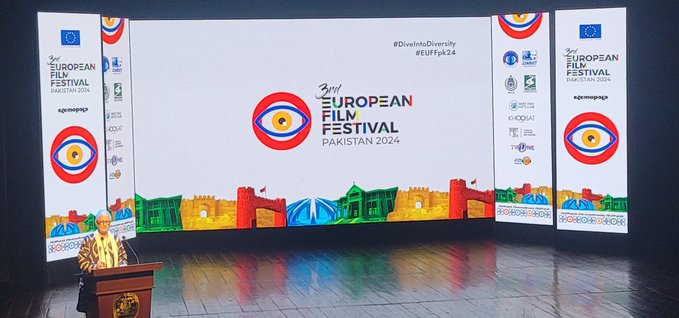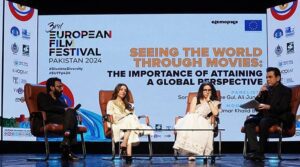Film festivals are much more than a showcase of movies; they are cultural gatherings that offer a unique opportunity to explore and understand diverse cultures, foster creativity, and build a sense of community. The Third European EU Film Festival 2024 celebrates success in Pakistan, bringing European cinema to audiences across Islamabad, Peshawar, Quetta, and Gujrat between May 16th and 29th, 2024. This festival went beyond showcasing movies; it served as a cultural gathering that offered a unique opportunity to explore and understand diverse cultures, foster creativity, and build a sense of community. By enriching the local cultural landscape and strengthening ties between Europe and Pakistan, the festival encouraged cultural exchange and mutual appreciation.
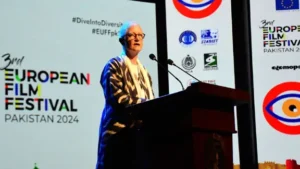
Mission and Goal:
Rooted in cultural diplomacy, the European Film Festival 2024 aimed to foster connections and understanding between Europe and Pakistan. Through carefully selected films and engaging activities, the festival sought to spark conversations and celebrate global cinema. By transcending borders, it aimed to cultivate a shared appreciation for cinematic artistry.
Festival Highlights:
The EUFF 2024 showcased over 20 captivating films from European Union Member States, spanning genres and themes. From dramas to documentaries, each film offered a unique glimpse into European society and culture. Complementing these were Pakistani short films, adding a local flavor to the festival’s diverse lineup.
Festival Activities:
Beyond the movies, the festival buzzed with interactive installations, tantalizing food stalls, and engaging panel discussions. Attendees explored art and technology intersections, savored European and Pakistani cuisine, and participated in enlightening discussions and masterclasses.
Impact of the Festival:
The European Film Festival 2024 made a lasting impression on both audiences and Pakistan’s film industry. By exposing Pakistani viewers to European cinema, it sparked conversations and fostered cultural appreciation. Through inclusive programming, the festival inspired connections and reflections, paving the way for deeper cross-cultural understanding.
How Does Cinema Contribute to Cultural Diplomacy?
Throughout the twentieth century and beyond, film has emerged as one of the most influential and accessible mediums of cultural diplomacy. Its unique ability to reach and affect global audiences has allowed it to educate, break stereotypes, and transcend borders. For example, the 1942 classic “Casablanca” not only entertained but also subtly promoted the Allied cause during World War II, fostering a sense of unity and resistance against fascism. Similarly, the 1967 film “Guess Who’s Coming to Dinner” challenged racial prejudices by portraying an interracial couple during the height of the civil rights movement in the United States. More recently, films like “Slumdog Millionaire” (2008) have shed light on the lives of people in developing countries, helping to bridge cultural gaps and enhance global understanding. These films, among many others, have demonstrated the power of cinema to educate, build relationships, and break down barriers at multiple levels.
EU Initiative in Pakistan
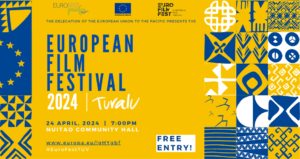
Film festivals like EUFF play a crucial role in bridging cultural gaps. By presenting a wide array of films from different European countries, the festival allows Pakistani audiences to experience stories and perspectives that they might not encounter otherwise. These films cover diverse genres and themes, from family and romance to climate change and human rights, providing a comprehensive view of European societies and their challenges. This exposure fosters a deeper understanding and appreciation of cultural differences and similarities, promoting empathy and global awareness. For example, the film “The Intouchables” from France, which tells the story of an aristocrat who becomes a quadriplegic from a paragliding accident and his unlikely friendship with his caregiver, addresses themes of disability, friendship, and social class. This film has resonated with audiences worldwide, including in Pakistan, by highlighting universal human experiences and challenges.
Another example is the Swedish film “A Man Called Ove,” which portrays an elderly man’s journey through grief, isolation, and unexpected friendships. This film’s exploration of aging, community, and personal transformation can offer Pakistani viewers insights into similar social issues within their own context.
Cultural diplomacy is another significant aspect of film festivals. The EUFF, by showcasing European films, acts as a platform for cultural diplomacy, where countries can present their cultural values and social issues to a foreign audience. For instance, the inclusion of themes such as economic hardship and human rights in the film lineup can spark discussions and reflections that transcend national boundaries, fostering a global dialogue on these critical issues.
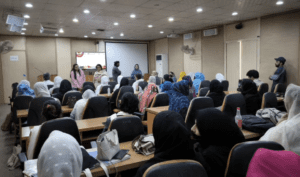
Film festivals are also incubators for creativity and innovation. They provide a platform for filmmakers to showcase their work, receive feedback, and gain inspiration from their peers. This environment encourages experimentation and the sharing of ideas, which can lead to new and innovative approaches to filmmaking. For Pakistani filmmakers, the EUFF offers a valuable opportunity to present their short films alongside European films, gaining international exposure and learning from established filmmakers. This cross-pollination of ideas can invigorate the local film industry, driving it towards greater creativity and excellence.
The masterclass titled “Decoding European Cinema,” led by filmmaker Ali Junejo, is an excellent example of how film festivals can contribute to professional development. Open to aspiring and practicing filmmakers, this masterclass aims to enhance understanding of world cinema and build professional capacity within the local film industry. Such initiatives are crucial for nurturing talent and promoting the growth of the film sector in Pakistan.
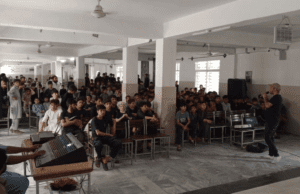
Film festivals bring significant economic and social benefits to host communities. Economically, they attract visitors, generate revenue for local businesses, and create job opportunities. The European Union Film Festival (EUFF) exemplifies this impact with its various activities and events likely to boost local economies. For instance, the Tribeca Film Festival in New York and the Sundance Film Festival in Utah are known for generating substantial revenue for local businesses, benefiting hotels, restaurants, and transportation services. Similarly, the presence of food stalls and interactive installations at EUFF enhances the festival experience while supporting local vendors and entrepreneurs, much like the temporary businesses that thrive during the Cannes Film Festival.
Socially, film festivals contribute to the cultural enrichment of communities by providing platforms for cultural expression and dialogue. The Berlin International Film Festival (Berlinale) and the Toronto International Film Festival (TIFF) are renowned for their focus on social issues and human rights, showcasing films that address these themes and promoting inclusivity. The EUFF, with its emphasis on themes such as disability and human rights, has the potential to raise awareness about important social issues. Festivals like the South by Southwest (SXSW) Film Festival in Austin also include panels and discussions on pressing social topics, fostering vibrant community dialogue. These examples illustrate how film festivals serve as catalysts for both economic growth and social change, enriching the communities that host them.
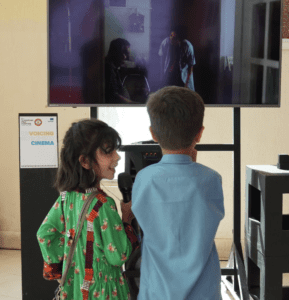
One of the most valuable aspects of film festivals is their celebration of diversity and inclusion. The EUFF’s diverse lineup of films reflects the rich cultural tapestry of Europe, offering Pakistani audiences a window into the lives and expe
riences of people from different backgrounds. This celebration of diversity is not just limited to the films themselves but extends to the festival’s programming, which includes panel discussions and masterclasses designed to engage and educate.
The festival’s commitment to inclusion is evident in its efforts to make the events accessible to a broad audience. By offering free entry to the public and hosting events in multiple cities, the EUFF ensures that people from different socio-economic backgrounds can participate. This inclusive approach helps to democratize access to cultural experiences, making the arts more accessible to everyone.
“In the EU, we actively support filmmaking not only as an art form but also as a means to bring people together to address important social topics. We believe that good cinema plays an important social and political role to contribute to a pluralistic society based on respect for others, as well as on equality and democratic decision-making. That’s why exchanges and discussions occupy a prominent place in the festival.”-
Ambassador of EU to Pakistan Dr Riina Kionka
The Third European Film Festival (EUFF) 2024 in Pakistan is more than just a celebration of cinema, it is a celebration of culture, creativity, and community. By bringing European films to Pakistani audiences, the festival promotes cultural understanding, fosters creativity, and builds a sense of community. It provides a platform for cultural diplomacy, professional development, and social dialogue, contributing to the cultural enrichment of the host communities. As we look forward to the festival, we can anticipate a rich and rewarding experience that will leave a lasting impact on both the audiences and the local film industry.
In a world that is increasingly interconnected, film festivals like the EUFF play a vital role in fostering mutual understanding and appreciation among different cultures. They remind us of the power of cinema to bring people together, spark conversations, and inspire change. As Pakistani audiences prepare to embark on this cinematic journey across Europe, we can look forward to a festival that celebrates the beauty of diversity and the shared human experience.
|
|
|
For the full report visit their website
Check our previous article on EUROPE DAY

